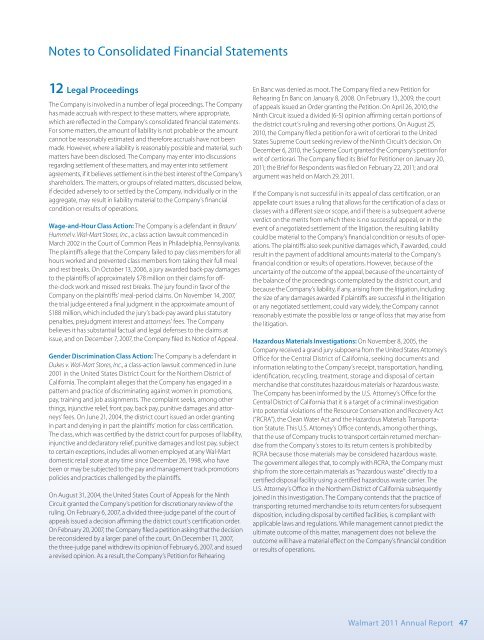Management's Discussion and Analysis of Financial ... - Wal-Mart
Management's Discussion and Analysis of Financial ... - Wal-Mart
Management's Discussion and Analysis of Financial ... - Wal-Mart
- No tags were found...
You also want an ePaper? Increase the reach of your titles
YUMPU automatically turns print PDFs into web optimized ePapers that Google loves.
Notes to Consolidated <strong>Financial</strong> Statements12 Legal ProceedingsThe Company is involved in a number <strong>of</strong> legal proceedings. The Companyhas made accruals with respect to these matters, where appropriate,which are reflected in the Company’s consolidated financial statements.For some matters, the amount <strong>of</strong> liability is not probable or the amountcannot be reasonably estimated <strong>and</strong> therefore accruals have not beenmade. However, where a liability is reasonably possible <strong>and</strong> material, suchmatters have been disclosed. The Company may enter into discussionsregarding settlement <strong>of</strong> these matters, <strong>and</strong> may enter into settlementagreements, if it believes settlement is in the best interest <strong>of</strong> the Company’sshareholders. The matters, or groups <strong>of</strong> related matters, discussed below,if decided adversely to or settled by the Company, individually or in theaggregate, may result in liability material to the Company’s financialcondition or results <strong>of</strong> operations.Wage-<strong>and</strong>-Hour Class Action: The Company is a defendant in Braun/Hummel v. <strong>Wal</strong>-<strong>Mart</strong> Stores, Inc., a class action lawsuit commenced inMarch 2002 in the Court <strong>of</strong> Common Pleas in Philadelphia, Pennsylvania.The plaintiffs allege that the Company failed to pay class members for allhours worked <strong>and</strong> prevented class members from taking their full meal<strong>and</strong> rest breaks. On October 13, 2006, a jury awarded back-pay damagesto the plaintiffs <strong>of</strong> approximately $78 million on their claims for <strong>of</strong>fthe-clockwork <strong>and</strong> missed rest breaks. The jury found in favor <strong>of</strong> theCompany on the plaintiffs’ meal-period claims. On November 14, 2007,the trial judge entered a final judgment in the approximate amount <strong>of</strong>$188 million, which included the jury’s back-pay award plus statutorypenalties, prejudgment interest <strong>and</strong> attorneys’ fees. The Companybelieves it has substantial factual <strong>and</strong> legal defenses to the claims atissue, <strong>and</strong> on December 7, 2007, the Company filed its Notice <strong>of</strong> Appeal.Gender Discrimination Class Action: The Company is a defendant inDukes v. <strong>Wal</strong>-<strong>Mart</strong> Stores, Inc., a class-action lawsuit commenced in June2001 in the United States District Court for the Northern District <strong>of</strong>California. The complaint alleges that the Company has engaged in apattern <strong>and</strong> practice <strong>of</strong> discriminating against women in promotions,pay, training <strong>and</strong> job assignments. The complaint seeks, among otherthings, injunctive relief, front pay, back pay, punitive damages <strong>and</strong> attorneys’fees. On June 21, 2004, the district court issued an order grantingin part <strong>and</strong> denying in part the plaintiffs’ motion for class certification.The class, which was certified by the district court for purposes <strong>of</strong> liability,injunctive <strong>and</strong> declaratory relief, punitive damages <strong>and</strong> lost pay, subjectto certain exceptions, includes all women employed at any <strong>Wal</strong>-<strong>Mart</strong>domestic retail store at any time since December 26, 1998, who havebeen or may be subjected to the pay <strong>and</strong> management track promotionspolicies <strong>and</strong> practices challenged by the plaintiffs.On August 31, 2004, the United States Court <strong>of</strong> Appeals for the NinthCircuit granted the Company’s petition for discretionary review <strong>of</strong> theruling. On February 6, 2007, a divided three-judge panel <strong>of</strong> the court <strong>of</strong>appeals issued a decision affirming the district court’s certification order.On February 20, 2007, the Company filed a petition asking that the decisionbe reconsidered by a larger panel <strong>of</strong> the court. On December 11, 2007,the three-judge panel withdrew its opinion <strong>of</strong> February 6, 2007, <strong>and</strong> issueda revised opinion. As a result, the Company’s Petition for RehearingEn Banc was denied as moot. The Company filed a new Petition forRehearing En Banc on January 8, 2008. On February 13, 2009, the court<strong>of</strong> appeals issued an Order granting the Petition. On April 26, 2010, theNinth Circuit issued a divided (6-5) opinion affirming certain portions <strong>of</strong>the district court’s ruling <strong>and</strong> reversing other portions. On August 25,2010, the Company filed a petition for a writ <strong>of</strong> certiorari to the UnitedStates Supreme Court seeking review <strong>of</strong> the Ninth Circuit’s decision. OnDecember 6, 2010, the Supreme Court granted the Company’s petition forwrit <strong>of</strong> certiorari. The Company filed its Brief for Petitioner on January 20,2011; the Brief for Respondents was filed on February 22, 2011; <strong>and</strong> oralargument was held on March 29, 2011.If the Company is not successful in its appeal <strong>of</strong> class certification, or anappellate court issues a ruling that allows for the certification <strong>of</strong> a class orclasses with a different size or scope, <strong>and</strong> if there is a subsequent adverseverdict on the merits from which there is no successful appeal, or in theevent <strong>of</strong> a negotiated settlement <strong>of</strong> the litigation, the resulting liabilitycould be material to the Company’s financial condition or results <strong>of</strong> operations.The plaintiffs also seek punitive damages which, if awarded, couldresult in the payment <strong>of</strong> additional amounts material to the Company’sfinancial condition or results <strong>of</strong> operations. However, because <strong>of</strong> theuncertainty <strong>of</strong> the outcome <strong>of</strong> the appeal, because <strong>of</strong> the uncertainty <strong>of</strong>the balance <strong>of</strong> the proceedings contemplated by the district court, <strong>and</strong>because the Company’s liability, if any, arising from the litigation, includingthe size <strong>of</strong> any damages awarded if plaintiffs are successful in the litigationor any negotiated settlement, could vary widely, the Company cannotreasonably estimate the possible loss or range <strong>of</strong> loss that may arise fromthe litigation.Hazardous Materials Investigations: On November 8, 2005, theCompany received a gr<strong>and</strong> jury subpoena from the United States Attorney’sOffice for the Central District <strong>of</strong> California, seeking documents <strong>and</strong>information relating to the Company’s receipt, transportation, h<strong>and</strong>ling,identification, recycling, treatment, storage <strong>and</strong> disposal <strong>of</strong> certainmerch<strong>and</strong>ise that constitutes hazardous materials or hazardous waste.The Company has been informed by the U.S. Attorney’s Office for theCentral District <strong>of</strong> California that it is a target <strong>of</strong> a criminal investigationinto potential violations <strong>of</strong> the Resource Conservation <strong>and</strong> Recovery Act(“RCRA”), the Clean Water Act <strong>and</strong> the Hazardous Materials TransportationStatute. This U.S. Attorney’s Office contends, among other things,that the use <strong>of</strong> Company trucks to transport certain returned merch<strong>and</strong>isefrom the Company’s stores to its return centers is prohibited byRCRA because those materials may be considered hazardous waste.The government alleges that, to comply with RCRA, the Company mustship from the store certain materials as “hazardous waste” directly to acertified disposal facility using a certified hazardous waste carrier. TheU.S. Attorney’s Office in the Northern District <strong>of</strong> California subsequentlyjoined in this investigation. The Company contends that the practice <strong>of</strong>transporting returned merch<strong>and</strong>ise to its return centers for subsequentdisposition, including disposal by certified facilities, is compliant withapplicable laws <strong>and</strong> regulations. While management cannot predict theultimate outcome <strong>of</strong> this matter, management does not believe theoutcome will have a material effect on the Company’s financial conditionor results <strong>of</strong> operations.<strong>Wal</strong>mart 2011 Annual Report 47





